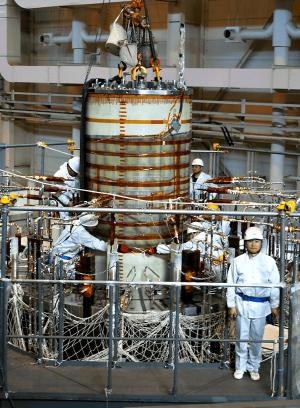Naka checks ITER heartbeat
7 Sep 2015
-
Lynne Degitz, US ITER
In another step towards building the ITER fusion reactor, the US ITER team has worked with international partners to verify the performance of the ITER central solenoid conductor. Using a US-designed "insert coil" (a test coil inserted in a large, high-field magnet), the international team tested the Japanese-manufactured central solenoid conductor at the Japan Atomic Energy Agency test facility in Naka and evaluated the findings. Results showed that the conductor performed as predicted, without degradation.
The ITER central solenoid is under fabrication in the US at a General Atomics facility in Poway, California using conductor provided by Japan. The 1,000-metric-ton electromagnet, known as the "heartbeat" of ITER, will provide the majority of the magnetic flux needed to start and sustain ITER's plasma current. Over 42 kilometres of conductor will ultimately be wound into pancakes and assembled into the modules of the central solenoid. The electromagnet will have a magnetic field strength of up to 13 Tesla, or about 260,000 times the Earth's magnetic field.
"The testing in Naka verified conductor performance under conditions comparable to what the conductor will experience inside the ITER Tokamak—including temperature, magnetic field, current, and mechanical strain," said US ITER magnet team leader Wayne Reiersen.
Testing conductor before it is installed in the ITER machine is part of confirming the ITER design and assuring that the conductor will perform in the demanding ITER environment. ITER, which will be the largest tokamak ever built, will employ multiple superconducting magnet systems to confine plasma of over 100 million degrees within a vacuum vessel inside the 10-story-tall tokamak.


